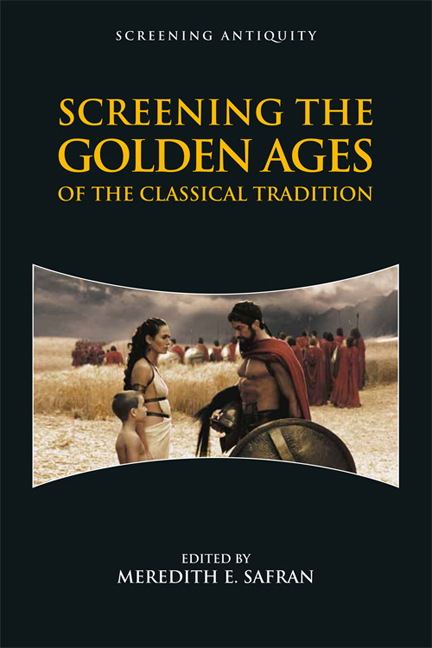Book contents
- Frontmatter
- Contents
- Series Editors’ Preface
- Editor's Acknowledgments
- Contributors
- Illustrations
- Abbreviations
- Introduction: Searching for Gold in an Age of Iron
- PART I THE GLORY THAT WAS GREECE
- PART II THE GRANDEUR THAT WAS ROME
- 8 “All That Glitters …”: Problematizing Golden-Age Narratives in Vergil's Aeneid and the Western Film Genre
- 9 The Golden Age and Imperial Dominance in the Aeneid and Serenity (2005)
- 10 Turning Gold into Lead: Sexual Pathology and the De-mythologizing of Augustus in HBO's Rome (2005–2007)
- 11 The Dux Femina Ends Westeros’ Golden Age: Cersei Lannister as Agrippina the Younger in HBO's Game of Thrones (2011–)
- 12 The Golden Aspects of Roman Imperialism in Film, 1914–2015
- 13 Broken Eagles: The Iron Age of Imperial Roman Warfare in Post-9/11 Film
- 14 Dreaming of Rome with Ridley Scott's Gladiator (2000)
- Filmography
- Bibliography
- Index
12 - The Golden Aspects of Roman Imperialism in Film, 1914–2015
from PART II - THE GRANDEUR THAT WAS ROME
Published online by Cambridge University Press: 23 November 2019
- Frontmatter
- Contents
- Series Editors’ Preface
- Editor's Acknowledgments
- Contributors
- Illustrations
- Abbreviations
- Introduction: Searching for Gold in an Age of Iron
- PART I THE GLORY THAT WAS GREECE
- PART II THE GRANDEUR THAT WAS ROME
- 8 “All That Glitters …”: Problematizing Golden-Age Narratives in Vergil's Aeneid and the Western Film Genre
- 9 The Golden Age and Imperial Dominance in the Aeneid and Serenity (2005)
- 10 Turning Gold into Lead: Sexual Pathology and the De-mythologizing of Augustus in HBO's Rome (2005–2007)
- 11 The Dux Femina Ends Westeros’ Golden Age: Cersei Lannister as Agrippina the Younger in HBO's Game of Thrones (2011–)
- 12 The Golden Aspects of Roman Imperialism in Film, 1914–2015
- 13 Broken Eagles: The Iron Age of Imperial Roman Warfare in Post-9/11 Film
- 14 Dreaming of Rome with Ridley Scott's Gladiator (2000)
- Filmography
- Bibliography
- Index
Summary
In Monty Python's Life of Brian (1979), the leader of the People's Front of Judea (PFJ) famously demands to know, “What have the Romans ever done for us?” Presumably he, like the audience reared on a “golden age” of Roman-themed films during the 1940s and especially the 1950s, expects to hear a list of examples of Roman oppression: the evils of slavery, crucifixion, religious persecution, possibly corruption and debauchery resulting from effeminate, secularized “over-civilization.” Hollywood's Rome was also associated with fascism and unorthodox sexual behaviors, both perceived as active dangers during the mid-twentieth century. Instead, the PFJ members point out the many advantages that ordinary Judeans benefit from under Roman rule: “the sanitation, the medicine, education, wine, public order, irrigation, roads” – in sum, the features of a highly organized, advanced society that claims the title of “civilization.” This may be the sort of “civilization” that, as Tacitus would argue, is actually oppressive colonialism, but it does have its notable benefits for the ordinary citizen. In this reversal of audience assumptions from sword-and-sandal movies, the Pythons reflect upon the cinematic norms that shaped dominant representations of Roman imperialism in the twentieth century. The Roman Empire can serve as a simplistic metaphor for the evils of authoritarianism, but it has also been used by directors and screenwriters to celebrate the beneficial aspects of Roman civilization.
Such positive valuations of Roman imperialism as ennobling and civilizing – like the negative portrayals of the Romans as oppressive villains – are hardly offered naïvely. Rather, they are generally offered in order to defend or support contemporaneous social models: the producers’ and consumers’ own imperialist societies. During moments of social and political anxiety about the nature and effects of imperialism, modern media have sometimes turned to a particular vision of the Roman Empire as a potential model for, or at least a mirror of, contemporary society and its concerns. Filmmakers seeking to promote imperialism as beneficial or to defend its last remnants have focused on the unifying and meritocratic aspects of Roman society, rather than its oppressive aspects. Three positive aspects attributed to the Roman Empire in conventional Western historical narratives – law and order, multiculturalism, and warrior masculinity – are stated and echoed in Italian films of the 1910s to 1930s, American and British films from 1964 to 1980, and British and American films from 2000 to 2015.
- Type
- Chapter
- Information
- Screening the Golden Ages of the Classical Tradition , pp. 225 - 242Publisher: Edinburgh University PressPrint publication year: 2018



